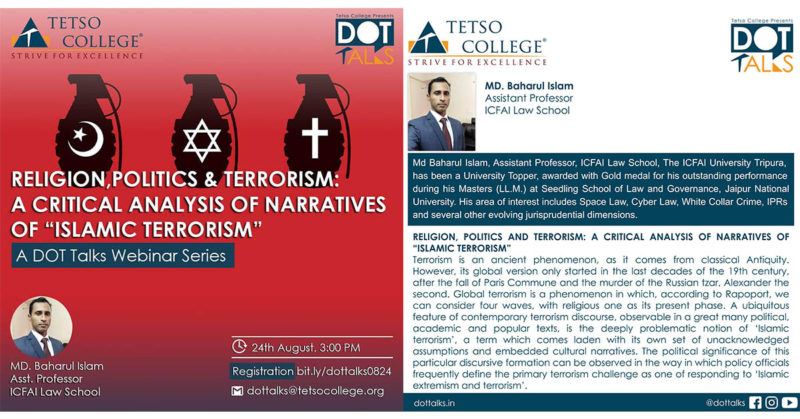In this webinar, MD. Baharul Islam, Assistant Professor, ICFAI Law School, The ICFAI University Tripura, speaking as the resource person, attempted to dispel the ubiquitous feature of contemporary terrorism discourse and the deeply problematic notion of ‘Islamic terrorism’, a term which comes laden with its own set of unacknowledged assumptions and embedded cultural narratives.
Held on 24th August 2020 and moderated by Dr. Aniruddha Babar, Assistant Professor, Department of Political Science, the resource speaker propounded on the history of terrorism as an ancient phenomenon while the global version started in the last decade of the 19th Century, after the fall of the Paris Commune and the murder of the Russian Tzar. He explained that global terrorism can be identified into four waves, according to Rapoport, with religion at its present phase.
Coming to the notion of ‘Islamic Terrorism,’ Baharul asserted that policy officials frequently define the primary terrorism challenge as one of responding to ‘Islamic extremism and terrorism’ and added that the word terrorism becomes more controversial when it is paralleled with Islam. He further described the social psychology of terrorism by stating that psychological profiles of terrorists have revealed that they are fairly typical of the groups from which they come and these groups are sensitive to the consequences of domination. Between the humiliations of denigration, powerlessness in face of domination and hopelessness for the expected future, terrorism becomes a means to a goal that ameliorates resentment through revenge, he maintained.
Baharul also made comparisons to terrorism and identity. Young men in particular social/cultural locations are prone to certain social and political stresses that foster their identities, and the lack of alternative sources of agency and respect lead to compensatory identities of hate and violence preached in cults of death, he observed.
The resource speaker then sought to deconstruct the association of Islam and terrorism by explaining in totality the definitions of jihad, holy war, misinterpretation of texts in the Quran, etc. By analyzing the 9/11 attacks, London bombings, Madrid bombings, the resource speaker also mentioned that the media had a role in shaping the collective outlook of the masses towards Islam as ‘a violent religion.’ In conclusion, Baharul called for sensitization and awareness on the part of the world in their perception about Islam and urged that educating them on correct concepts of the Islamic religious texts would go a long way in dispelling misconceptions.

